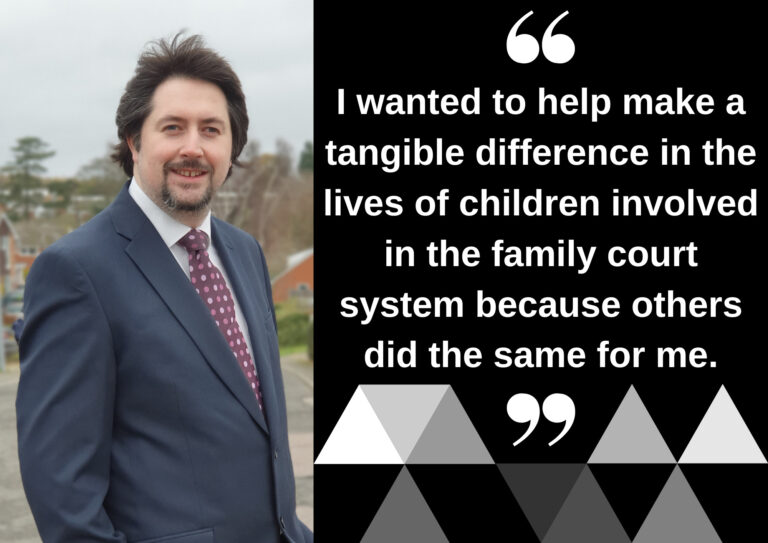Why I volunteer in the family court

As a magistrate, you can choose whether to sit in a criminal or family court. We spoke to Sam about why he decided to join the latter.
Tell us a bit about yourself.
I’m 39 years old and live with my wife and two young children in Bedfordshire. In my day job, I’m a senior manager in the rail industry.
I also volunteer in my community, chairing an older people’s charity in Buckinghamshire and a school Academy Trust in Hertfordshire.
In 2019, I added being a family magistrate to my already busy timetable!
What made you decide to divide even more of your time with even more volunteering?
Some colleagues at work signed up to be magistrates and always spoke highly of the experience, so I was confident it would be a great use of my time.
I also saw it as an excellent opportunity to upskill and apply what I would learn as a magistrate to my day job. I viewed the 13 days required to be in court each year as equally valuable as attending external work training courses. So, volunteering really felt like a win-win scenario for me and the community I’m committed to serving.
Why did you decide to become a magistrate in the family court instead of the criminal court?
I am a product of the decisions made in a family court because I was part of a case heard in one when I was around five years old. The decisions made there set the course for my life and ultimately meant that I went on to live with my father.
While I was too young to understand what was going on at the time, decisions were made on my behalf with my best interests at heart. Reflecting as an adult, my family court experience reinforced the importance of making the right decisions for children.
Ultimately, I wanted to help make a tangible difference in the lives of children involved in the family court system because others did the same for me.
What is the most rewarding element of your role as a magistrate?
Every time I step out of court – whether after a first or final hearing – I know I’ve played my part in a process that will impact the lives of children, parents, and everybody else involved.
That’s a real privilege.
There must be times when you hear highly emotional stories – how do you deal with that?
I was taught in training that it is so important to build resilience and find whatever mechanism works for you to get through emotive cases. I would be lying if I said it was easy to never dwell on a case once you are home with a moment to yourself. But I try as much as I can to decompress a little bit when I get home, and my toddler and seven-year-old sons keep me physically and mentally busy inventing new games!
I have also found looking to other magistrates for support really helpful. That support is also present when you start as a magistrate and get allocated a mentor who’s an experienced magistrate. They’ll observe you during some of your sittings and actually sit on the bench with you, ready to help if you need them.
I received that support even outside of the courtroom, as my mentor was a great person to talk to during particularly emotional cases.
How has being a magistrate impacted your day job? Are there any transferable skills your employer is benefiting from?
I get less stressed about things at work now because, in court, I make decisions that have a much more personal and long-lasting impact on others. So, this helps give me perspective and confidence that I can deal with challenges that may surface while at work.
As a family magistrate, I’m involved in emotionally charged cases which means I get to sharpen and develop skills in conflict resolution, communication, decision-making, research and teamwork, to name a few. I’ve also mastered disagreeing well, which is an excellent skill for anyone working in teams.
What would you say to someone thinking about being a magistrate in the family court?
Being a magistrate is a great way to contribute to your local community, develop skills and make life-changing decisions.
From day one, you will play a part in making a fundamental difference to the lives of the children and families in front of you; that’s a really awesome and incredibly rewarding responsibility to have.
If you feel you have the skills required for family cases and the emotional stories accompanying them, please consider signing up to become a family magistrate.
